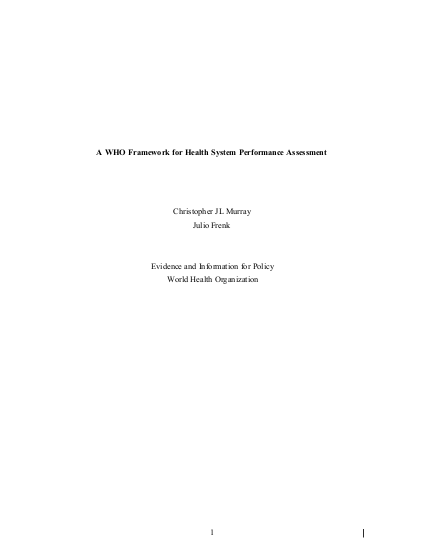
Across countries at similar levels of income and educational attainment, there is wide variation in health outcomes.(1,2) Some of this variation is due to differences in health system performance. Differences in the design, content and management of health systems translate into differences in a range of socially valued outcomes such as health, responsiveness or fairness. Decision-makers at all levels need to quantify the variation in health system performance, identify factors that influence it and ultimately articulate policies that will achieve better results in a variety of settings. Performance of sub-components of systems, such as regions within countries or public health services, also needs to be assessed. Meaningful, comparable information on health system performance and the key factors that explain variation therein can strengthen the scientific foundations of health policy at the international and national levels. We believe that a convincing and operational framework for assessing health system performance is vital for the work of governments, development agencies and multilateral institutions.
The several frameworks for measuring health system performance that have been proposed (3,4,5,6,7,8,9,10) are testimony to the importance given to this enterprise. Taken together, these frameworks are a rich source of ideas and approaches. Nevertheless, we believe that there is room for improvement. Approaches to health system performance often fall into two related traps. Some are long and inclusive lists of multiple and often overlapping desirable attributes of health systems. Various frameworks have, for example, included goals related to health, health inequalities, coverage, equitable financing, quality, consumer satisfaction, allocative efficiency, technical efficiency, cost containment, political acceptability or financial sustainability. Other approaches start from a consideration of which indicators are readily available and construct a performance assessment that replicates the conceptual and technical inadequacies of available measures. Both approaches are unsatisfactory for a comprehensive and meaningful assessment of health system performance.
We believe that a coherent and consistent framework should begin with addressing a simple question: what are health systems for? Once the intrinsic goals of health systems have been clearly articulated, the measurement of these goals, the concept of performance and the distinct notion of the key factors that influence performance must be explored. The framework presented here is work in progress. The conceptualization is more advanced than the operationalization. The progress on both conceptualization and operationalization is enough to hold out the realistic prospect that, starting with the World Health Report 2000, WHO will be able to present at least partial information on the relative performance of each country’s health system. This paper is both a framework but also a blueprint for further refinement and development work that WHO will pursue over the next 3 to 5 years.